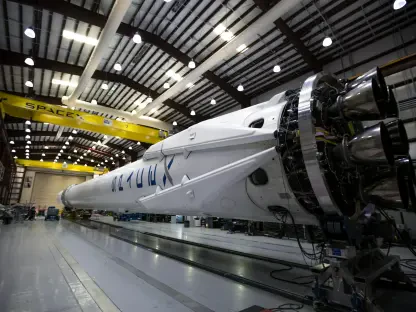In the dynamic landscape of Southeast Asia, a remarkable tech giant has emerged from an origin story that defies conventional business narratives, captivating attention with its meteoric rise and establishing itself as a symbol of innovation. Viettel, founded in 1989 under Vietnam’s Ministry of National Defense, has transformed from a humble constructor of antenna towers into a global technology leader, redefining the potential of a military-backed enterprise. Initially known as Sigelco, this entity has grown to become Vietnam’s largest telecommunications company, boasting a revenue of $7.2 billion in 2024 and establishing itself as a formidable player on the international stage. What makes Viettel’s journey so compelling is its blend of strategic innovation, deep national roots, and ambitious global outreach, all while navigating the complexities tied to its military origins. This ascent is not merely a corporate success but a reflection of Vietnam’s broader aspirations to carve out a significant space in the global tech arena, even as controversies cast occasional shadows over its achievements.
Foundations of Strength: Military Roots and Early Growth
Viettel’s beginnings are uniquely tied to Vietnam’s military framework, providing a foundation that sets it apart from traditional corporate entities. Established to bolster national defense through the development of telecommunications infrastructure, the company—renamed in 1995—quickly adapted to the rising demand for internet and mobile connectivity within the country. By 2012, Viettel had surpassed the state-owned VNPT to claim the title of Vietnam’s leading telecom provider, a feat underpinned by access to military resources and a dual mandate to serve both civilian and defense purposes. This synergy allowed Viettel to address critical national needs while building a robust commercial presence, creating a model of growth that intertwined state support with market-driven goals. The military connection, often cited as a strategic advantage, has enabled Viettel to operate with a level of stability and backing that few competitors can match, positioning it as a cornerstone of Vietnam’s technological evolution.
This military affiliation, while a source of strength, also introduces unique challenges and perceptions that Viettel must navigate. Scholars like Carlyle A. Thayer have pointed to the company’s “vital defense and security function,” highlighting how this role grants access to unparalleled resources and strategic priorities. However, this same connection fuels skepticism, particularly in international contexts where Viettel’s operations intersect with politically sensitive issues. In regions beyond Vietnam, the military ties raise questions about the broader implications of its business activities, creating a tension between its technological achievements and the perceptions of its state-backed nature. Despite these complexities, Viettel’s early focus on infrastructure laid critical groundwork for its expansion, demonstrating how a defense-oriented mission could evolve into a broader commercial success story that resonates both domestically and abroad, shaping its path as a tech leader.
Bridging Gaps: A Focus on Rural and Underserved Markets
One of Viettel’s most defining strategies has been its commitment to connecting rural and underserved communities, a move that challenged conventional business approaches. In Vietnam, where approximately 70% of the population resides in rural areas, Viettel recognized an untapped opportunity to build infrastructure and offer affordable services where connectivity was scarce. This focus not only addressed a critical societal need but also cultivated a loyal customer base, distinguishing Viettel from competitors who prioritized urban centers. By investing in remote regions at a time when hardware costs were declining, the company managed to balance accessibility with profitability, earning a reputation for quality and inclusivity. This rural-first mindset became a hallmark of Viettel’s operations, reflecting a deep understanding of local demographics and a willingness to innovate in market penetration strategies that others overlooked.
This pioneering approach to underserved markets extended beyond Vietnam’s borders, shaping Viettel’s international growth with remarkable effectiveness. In nations like Mozambique, Cambodia, and Myanmar, where telecom infrastructure was often underdeveloped, Viettel replicated its rural-focused model to capture significant market shares. By prioritizing countryside connectivity over urban hubs, as noted by industry expert Francisco Mobila, Viettel outmaneuvered rivals who adhered to more traditional expansion tactics. This counterintuitive strategy allowed rapid inroads into challenging environments, establishing the company as a leader in regions where others hesitated to invest. The success of subsidiaries like Movitel in Mozambique underscores how Viettel’s adaptability and focus on inclusivity have translated into global competitiveness, proving that addressing the needs of the underserved can yield both social impact and substantial business returns.
Driving Progress: Innovation and Technological Ambition
Innovation stands as a pillar of Viettel’s transformation into a global tech contender, with a clear emphasis on pushing technological boundaries. The company boasts 30 U.S. patents and has made significant strides in fields such as artificial intelligence, robotics, and 5G technology, showcasing a commitment to staying ahead of industry trends. Strategic partnerships with global leaders like Qualcomm, Nokia, and even Huawei—despite earlier reservations due to security concerns—highlight Viettel’s pragmatic approach to achieving technological autonomy. A notable milestone came with the development of 5G Open RAN technology alongside Qualcomm, completed in half the typical industry timeline, signaling Vietnam’s potential as a hub for digital infrastructure innovation. This blend of in-house research and collaborative efforts positions Viettel at the forefront of tech advancements, aligning with national goals to elevate the country’s global standing.
Beyond hardware, Viettel’s foray into emerging technologies reflects an ambition to lead in diverse domains. A 2024 partnership with South Korea’s KT Corporation to develop a Vietnamese language model for AI applications marks a significant step toward linguistic and cultural relevance in tech solutions. This initiative, paired with the broader “Make in Vietnam” strategy, underscores Viettel’s role in fostering national pride through innovation. By balancing collaborations with both Western and Asian tech giants, the company navigates geopolitical complexities while building a diversified portfolio of expertise. Such efforts not only enhance Viettel’s competitive edge but also contribute to a growing narrative of Vietnam as a serious player in the global tech landscape, driven by a company unafraid to explore uncharted territories in pursuit of progress and relevance.
Expanding Horizons: Global Presence and Ethical Dilemmas
Viettel’s international expansion paints a picture of both impressive reach and intricate challenges that accompany such ambition. Operating across 11 countries in Asia, Africa, and Latin America, Viettel Global reported a revenue of $1.3 billion in 2024, achieving breakeven in six key markets. The company’s 5G hardware contracts in nations like India, the Philippines, and the UAE, alongside mobile money solutions serving 23.2 million users worldwide, demonstrate a remarkable ability to adapt to diverse environments. Industry analysts like Julian Gorman from GSMA Intelligence commend Viettel’s resilience in navigating harsh operational landscapes, a testament to its strategic foresight. From disaster recovery efforts in Myanmar to infrastructure support in Mozambique, Viettel often pairs its business goals with humanitarian contributions, adding a layer of social responsibility to its global profile that enhances its reputation as a multifaceted operator.
Yet, this expansive growth is not without significant ethical concerns that cast a shadow over Viettel’s achievements. Operations in politically unstable regions, particularly through its Myanmar subsidiary MyTel, have drawn criticism from human rights groups like Justice for Myanmar, who accuse the company of enabling military surveillance and providing off-budget revenue to the junta. Viettel’s silence on these allegations contrasts with its positive contributions, creating a complex narrative of global ambition intertwined with moral questions. Balancing the pursuit of market dominance with the implications of operating in sensitive areas remains a persistent challenge. As Viettel continues to expand, the need to address such controversies transparently becomes increasingly critical, ensuring that its international success does not come at the expense of ethical credibility or public trust.
Charting the Future: Reflecting on a Complex Legacy
Looking back, Viettel’s journey from a military utility to a tech titan unfolded with a blend of strategic brilliance and intricate challenges that shaped its path. Over the years, the company carved a niche by connecting the unconnected, innovating relentlessly, and expanding into diverse global markets with an adaptability that few could rival. Revenue milestones and technological breakthroughs stood as testaments to a vision that transcended its defense origins, while partnerships with industry leaders solidified Vietnam’s place in the tech world. Yet, the shadow of ethical dilemmas, particularly in politically fraught regions, reminded all that success carried a weight of responsibility. As Viettel navigated these waters, it became clear that future growth hinged on addressing such issues head-on. Moving forward, stakeholders might consider prioritizing transparent engagement and sustainable practices to ensure that Viettel’s legacy evolves into one of balanced impact, setting a precedent for state-backed enterprises aiming to influence the global stage.









